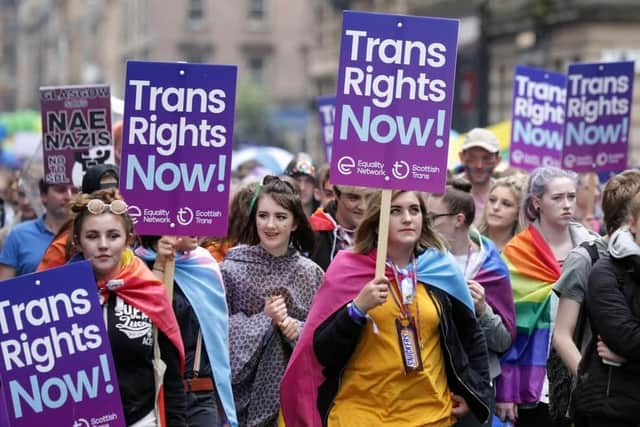Court battle over Scotland's gender reforms: How did we get here?
Few pieces of legislation have generated the level of controversy of the Gender Recognition Reform (Scotland) Bill. It seems strange, then, to recall that it was backed by a large cross-party majority of MSPs in December last year.
The reforms were passed in the Scottish Parliament by 86 votes to 39, approving changes which would allow trans people to obtain a gender recognition certificate (GRC) without the need for a medical diagnosis.
Advertisement
Hide AdAdvertisement
Hide AdThe Bill would also enable 16 and 17-year-olds to apply for a GRC for the first time, and would reduce the amount of time a person has to live in their acquired gender before they could be granted the document.


Its passage through the Scottish Parliament was accompanied by headline-grabbing protests and late-night sittings. Opponents raised concerns around protections for single-sex spaces, among other issues. They also argued the legislation was rushed through without its implications being properly considered – or even understood.
Former first minister Nicola Sturgeon rejected this, insisting the reforms had been developed over a number of years.
Debates in Holyrood saw bad-tempered exchanges. Green MSP Maggie Chapman accused others of “disturbing” anti-trans dog whistles. Spectators were removed from the chamber after cries of “shame on you” rang out as one amendment was rejected. A vote during an earlier stage led to an unprecedented rebellion among SNP MSPs, with one minister, Ash Regan, resigning and nine defying the whip.
In October last year, author JK Rowling posted a photo on social media in which she wore a T-shirt featuring the words: “Nicola Sturgeon: destroyer of women’s rights.” It was emblematic of the strength of feeling on both sides of a debate that extends far beyond the walls of the Scottish Parliament.
Trans rights, and how they might impact on women’s rights, have long been a source of contention in the UK and further afield. The issue has exploded into the mainstream in recent years, becoming increasingly toxic in the process.
In January, Scottish secretary Alister Jack confirmed the UK Government would block Scotland’s reforms using a never-before-utilised section of the 1998 Scotland Act. This section 35 order prevented the Bill from gaining royal assent.
Mr Jack argued the proposed law would conflict with equality protections applying across Great Britain, but Ms Sturgeon accused him of acting “like a governor-general” and called his intervention a "full-frontal attack on our democratically-elected Scottish Parliament”.
Advertisement
Hide AdAdvertisement
Hide AdThe Scottish Secretary raised concerns about "the operation of single-sex clubs, associations and schools, protections such as equal pay and chilling effects on single-sex spaces". The Equality and Human Rights Commission had highlighted the “potential cross-border implications” of the reforms months before they were rubber-stamped in Holyrood. These included the impact on provisions relating to sex discrimination, such as “equal pay between women and men, gender pay gap reporting, and measures to address disadvantages experienced by women”.
In other words, the Scottish Government must have known a row with UK ministers was likely. The politics of this – on both sides – is important.
The debate was further inflamed by the case of Isla Bryson, previously known as a man called Adam Graham. A huge row erupted in January when Bryson was initially sent to Cornton Vale women's prison after being convicted of raping two women. This was not a result of Scotland’s gender reforms – which, after all, had been blocked – but insiders still conceded the timing was "jaw-droppingly terrible".
The gender debate also featured heavily in the SNP leadership election following Nicola Sturgeon’s resignation in mid February. Humza Yousaf, the winner, committed himself to challenging the UK Government in court. But Ash Regan, the former SNP minister who resigned over the Bill, said Scottish ministers would lose this fight. Kate Forbes, who Mr Yousaf only narrowly defeated, said she would “seek legal advice”, but made her lack of enthusiasm clear.
Shortly after Mr Yousaf’s election, ministers confirmed they would lodge a petition for a judicial review. The court battle is set to begin on September 19. A legal figure previously told The Scotsman it could cost the public purse around half a million pounds, but cautioned: "All you can do is speculate." It is expected to go all the way to the UK Supreme Court.
Former Supreme Court judge Lord Sumption has described the Scottish Government’s position as “weak”, while Lord Hope, a former deputy president of the Supreme Court, has said the prospects of success are “very low”.
Polling may not fill Scottish ministers with joy either. A survey by Lord Ashcroft in February, for example, found just 29 per cent of respondents in Scotland supported the Bill, with 54 per cent opposed. Meanwhile, 50 per cent said the UK Government was right or within its rights to block the Bill, and 33 per cent disagreed. Key elements of the legislation – such as removing the requirement for a medical diagnosis or lowering the minimum age to 16 – have not proved particularly popular in previous polls.
Scottish Labour leader Anas Sarwar, who backed the legislation, now says it feels like “everybody has lost”. The UK Labour Party recently dropped its support for a self-ID system, citing the “mistakes” made in Scotland – a position that puts it at odds with the party north of the border.
Advertisement
Hide AdAdvertisement
Hide AdThe coming court battle will focus on the UK Government’s decision to block the Scottish legislation. It will be as simple and as complicated as that. It will do nothing to settle the wider philosophical and ideological conflict raging outside the courtroom walls.
Comments
Want to join the conversation? Please or to comment on this article.
